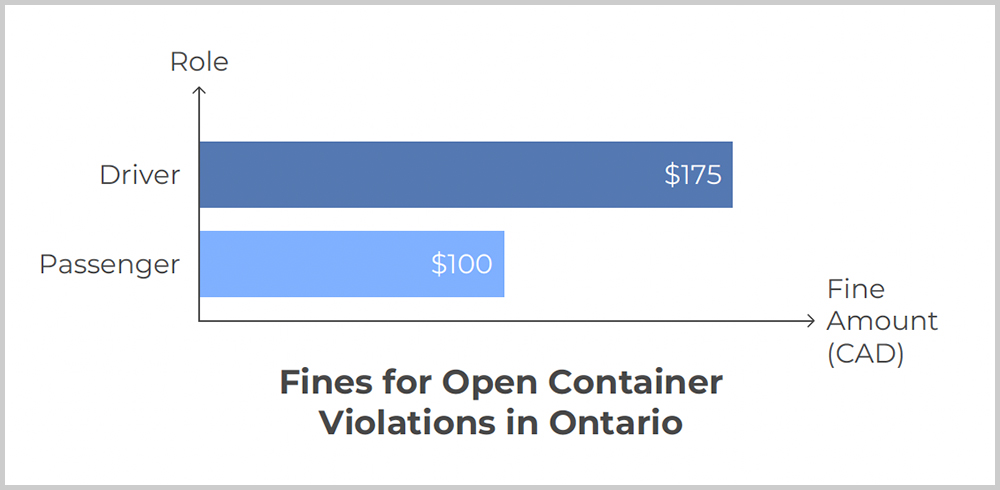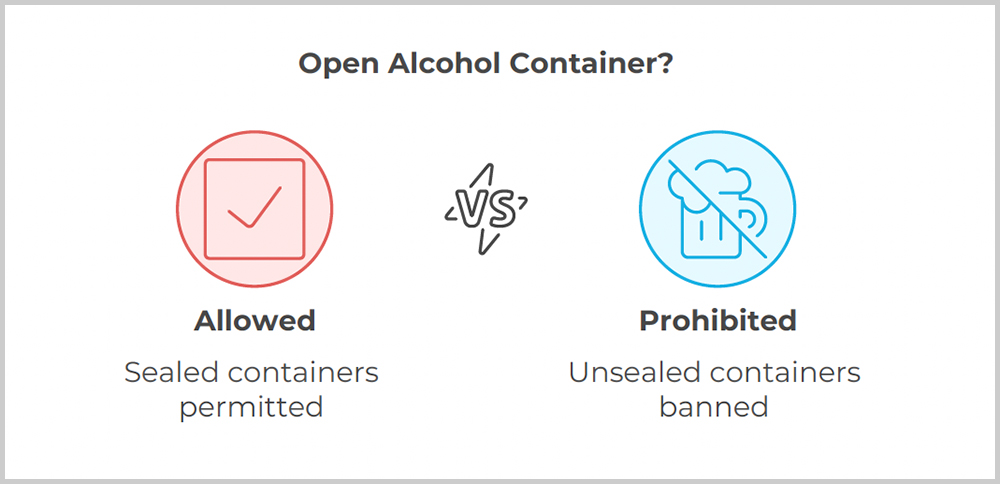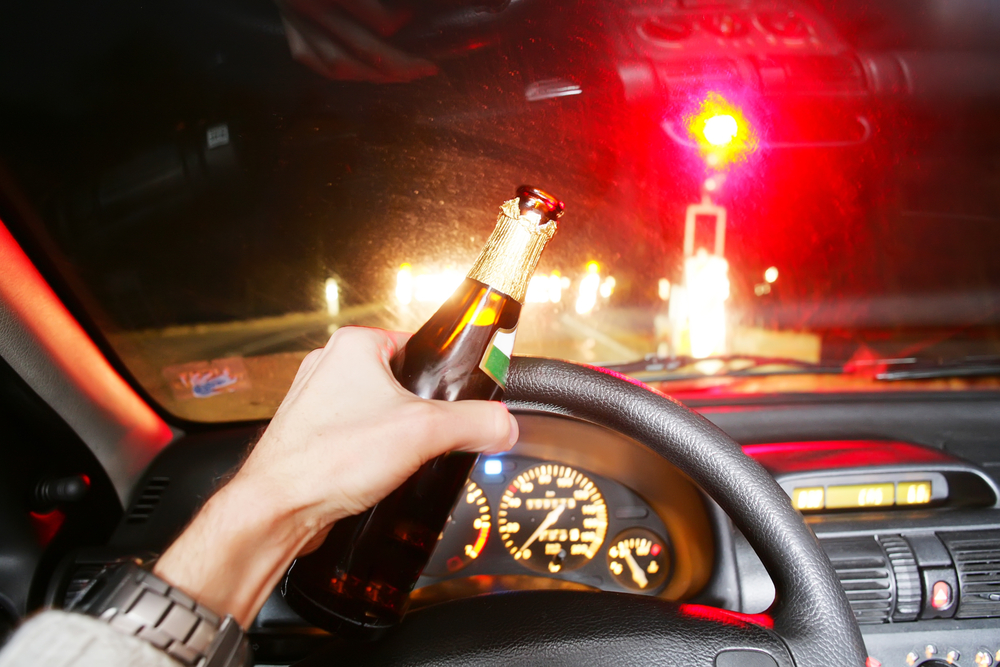Understanding Ontario’s Open Container Laws
Last Updated: October 14, 2024
Ontario’s open container laws are complex.
Open container laws are the laws that regulate the transportation or consumption of alcohol in a vehicle or public spaces. Most people grab a drink for the road when heading out to a night of partying, which is quite a common practice. However, most people might be unaware that this can result in a penalty.
There is a common misconception surrounding Ontario’s open container laws. Most people think because they have a designated driver and as long as the driver does not drink, it is safe for them to consume or have open alcohol while in the vehicle. In Ontario, a motor vehicle cannot transport open alcohol, nor can the passengers consume alcohol while in the motor vehicle.

It is essential to understand these laws because they can result in a fine under the Liquor License and Control Act to both the driver and the passengers of $175 and $100, respectively.
What are Open Container Laws?
An open alcohol container in Ontario is defined as unsealed alcohol in a prohibited area (i.e., a vehicle). There are some exceptions to this rule, such as if the liquor is in a sealed container or packaged in a container that is not readily available to anyone in the vehicle. For example, if you and your friends are going to a party, you cannot have unsealed liquor in the car unless it is in the trunk or locked in a separate compartment away from everyone.

This same rule extends to boats as well. Putting the liquor in a closed compartment of the vehicle is always best practice to ensure you do not have to undergo any breathalyzer procedures if you are pulled over.
Although Ontario’s open container laws may seem tedious and unnecessary, they are implemented from a public safety standpoint. The province wants to ensure people are not tempted or peer pressured by others to have a drink while driving. Furthermore, this reduces the harm caused by public intoxication and nuisance to the general public. Such laws would help ensure the safety of everyone on the road and streets.
Ontario’s specific open container laws:
s. 42(1) of the Liquor License and Control Act states no person shall drive or have the care or control of a motor vehicle as defined in the Highway Traffic Act or a motorized snow vehicle, whether it is in motion or not, while there is contained in the car any liquor, except under the authority of a license or permit or if the liquor is,
a) In a container, unopened and the seal is unbroken or
b) Packaged in baggage that is fastened closed or not otherwise readily available to any person in the vehicle.
These above rules apply to both the passenger and the driver.
Under s41(1), which restricts where a person can consume liquor, the following are places where it is acceptable.
a) A residence
b) Premises in respect of which license or permit that permits consumption is issued
c) A private place as prescribed by the regulations or;
d) A public place designated by a by-law made by the council of a municipality.
Some examples of where alcohol consumption laws in Ontario are allowed would be licensed areas such as bars, one’s residence, and special events, as long as one holds a valid license or permit.
Ontario’s open container laws can be challenging to understand. Just remember, if you are transporting alcohol in vehicles in Ontario, as long as the seal is unbroken, you are safe. However, if the seal is broken, make sure it is fastened in baggage that is closed or not accessible to anyone in the vehicle.
As for the alcohol consumption laws in Ontario, in a vehicle, it is prohibited; you can consume alcohol in any licensed area or an area that has a permit for special events and at a residence. Always check your local by-laws, as other public spaces may also be allowed.

Penalties for Violating the Open Container Laws in Ontario:
Schedule 61 of the Ontario Court of Justice outlines all the potential penalties one can face if they inappropriately transport alcohol in vehicles in Ontario. Number 81, the primary offence, states, ‘Driving a motor vehicle with an open container of liquor.’
If we recall, this violates section 41(1)(a) of the Liquor and License Control Act, and violating this rule results in a $175 penalty. Numbers 82-84 result in the same penalties but are just variations of the violating s41(1), for example, if the driver has control of the motor vehicle or the seal is unbroken.
Schedule 61 of the Ontario Court of Justice, Number 89, states that ‘Driving a motor vehicle with open baggage’ carries a penalty of $150. This would violate section 41(1)(b) of the Liquor and License Control Act if the alcohol were in an open compartment of the vehicle. Number 90 is the same thing, but the car is in a person’s control or care. Number 93 is driving a motor vehicle if liquor is readily accessible to the passengers or driver. Number 94 is if a person in control or care of the motor vehicle has liquor readily accessible, resulting in a $150 penalty.
Although these penalties may seem minor, they could lead to an impaired driving investigation. If the driver had a few drinks, it is possible they could blow over the legal limit. In addition, it may depend on why you were pulled over; if you and your friends were causing a public disturbance while intoxicated, this could further lead to a criminal charge of causing a public disturbance in a public area. This results in a criminal record, and in certain circumstances, it can increase insurance rates and harm your driving record.
Recent Changes or updates
As of April 2024, the Toronto City Council has approved drinking in some municipal parks. For more information on which parks are included in the program, refer to toronto.ca/alcoholinparks. Also, refer to your municipality to ensure you comply with their bylaws.
Although this allows for drinking in some public parks, there are some rules to remember.
Public intoxication is still a criminal offence, and it is important to be respectful of those around you. In addition, keep more than a 2-metre distance from any playgrounds, pools, skate parks, and outdoor rinks. This does not change any of the other standard laws surrounding alcohol consumption: No drinking and driving, a person must be of the legal drinking age at least 19 years old, cannot provide alcohol to any persons under 19 years old, a person must follow the rules to dispose of any garbage and drinking can only be done between 5:30 AM to Midnight at an approved park.
In the fall of 2024, Ontario liquor laws will be updated, and Ontario convenience stores will sell beer and wine. This is a significant change to the province, as previously, the government regulated all the liquor.
This change and the alcohol consumption laws of being allowed to drink in some parks show some relaxation in the rules but are still heavily regulated. These changes in the future may lead to the privatization of liquor stores, resulting in more competitive pricing, but for now, the government still controls all the hard liquor.
Conclusion:
In short, Ontario’s open container laws may seem complex. Still, the key takeaway is to remember if you are transporting alcohol in vehicles in Ontario and the seal is broken, ensure the alcohol is stored in a compartment that is inaccessible to all the passengers. Secondly, if you are drinking outside of a residence, ensure it is a licensed area, a special event with a valid license or check with the local by-laws to ensure it is acceptable to drink there.
Open container and alcohol consumption laws in Ontario are constantly changing; make sure you stay up to date with the current regulations and comply with them; otherwise, you can pay a penalty. Book a free consultation with one of our lawyers to discuss the specifics of your case.
Get A Free Consultation
"*" indicates required fields



